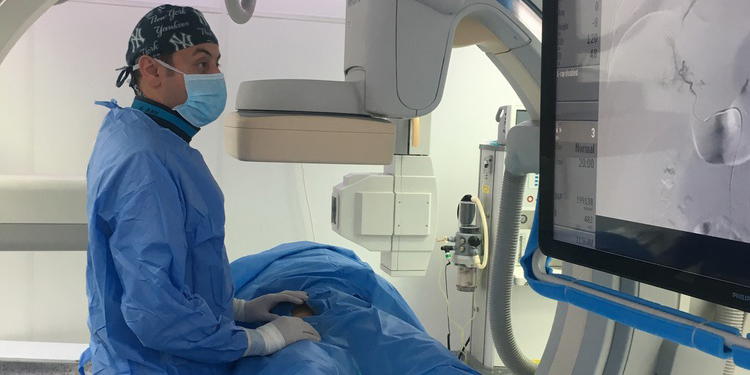
Overview
Understanding Pelvic Congestion Syndrome: An In-Depth Overview
What is Pelvic Congestion Syndrome?
Pelvic Congestion Syndrome (PCS) is a condition causing persistent pelvic pain, believed to result from issues in the pelvic veins. These veins, responsible for returning blood to the heart, may malfunction in some women, leading to an accumulation of blood and varicose vein-like changes in the pelvis. PCS primarily affects women of childbearing age, especially those who have given birth to multiple children. Despite its prevalence, the condition is often misunderstood, with some women being wrongly told their pain is psychological. Recent advancements link chronic pelvic pain to hard-to-detect varicose veins in the pelvis, highlighting the importance of understanding and addressing Pelvic Congestion Syndrome.
Symptoms of Pelvic Congestion Syndrome (PCS):
Pelvic Congestion Syndrome (PCS) is characterized by chronic pelvic pain persisting for at least six months, often beginning during or after pregnancy. This overview delves into key symptoms, such as varying pain sensations, aggravating factors, and additional indicators, shedding light on the significant impact PCS has on daily life. Recognizing these symptoms is pivotal for timely diagnosis and intervention, enabling individuals to navigate PCS with informed clarity.
Prevalence:
- PCS is more common in women under 45, particularly those in their childbearing years.
- Chronic pelvic pain accounts for 15 percent of outpatient gynecologic visits.
- Studies indicate that 30 percent of patients with chronic pelvic pain have PCS as the sole cause and an additional 15 percent have PCS along with another pelvic pathology.
Risk Factors:
- Women with two or more pregnancies and hormonal increases are at higher risk.
- The fullness of leg veins is a notable risk factor.
- The chronic pain associated with PCS is typically dull and aching, felt in the lower abdomen and lower back.
- Specific times, such as during or after intercourse, menstrual periods, fatigue, and pregnancy, often exacerbate the pain.
Other Symptoms Include:
- Irritable bladder.
- Abnormal menstrual bleeding.
- Vaginal discharge.
- Presence of varicose veins on the vulva, buttocks, or thigh.
Diagnosis and Assessment of Pelvic Congestion Syndrome (PCS):
Diagnosing Pelvic Congestion Syndrome (PCS) presents a unique challenge due to the multifaceted nature of pelvic pain and its diverse potential causes. This comprehensive overview highlights the meticulous approach undertaken by healthcare providers in identifying PCS amid the myriad factors contributing to pelvic discomfort.
Diagnostic Tests:
- Urine and Blood Tests: Examine urinary system health. Check for pregnancy, sexually transmitted infections (STIs), anemia, and other conditions.
- Imaging Studies:
- Pelvic Ultrasound: Rule out other problems causing pelvic pain. Limited utility for visualizing pelvic veins unless performed with the patient standing.
- Transvaginal Ultrasound: Offers better visualization inside the pelvic cavity. Useful for excluding other problems.
- Advanced Imaging:
- Doppler Ultrasound: Assess blood flow in pelvic blood vessels.
- MRI: Non-invasive, adapted for examining pelvic blood vessels. Particularly useful when a standard MRI may not reveal abnormalities.
- CT Scan: Provides detailed images of the pelvis.
- Invasive Procedures (if needed):
- Diagnostic Laparoscopy: Rules out other causes of pelvic pain.
- Pelvic Venography: Injects X-ray dye for enhanced visibility of pelvic veins.
Treatments for Pelvic Congestion Syndrome:
Navigating Pelvic Congestion Syndrome (PCS) involves a strategic approach to tailored treatments addressing individual symptoms. With Dr. Mohamed Hosni, a specialist in women's health, consider the following options:
Medical Intervention:
Explore gonadotropin-releasing hormone and progestin hormone drugs.
Minimally Invasive Procedures:
Consider sclerotherapy and embolization for targeted relief.
Surgical Interventions:
Evaluate vein removal surgery or hysterectomy in severe cases.
Progressive Approach:
Initiate medications, progressing to procedures if symptoms persist. As menopause nears, natural symptom relief may occur.
If you're experiencing persistent pelvic pain or suspect PCS, take charge of your well-being with Dr. Mohamed Hosni's expertise. Schedule an appointment or Explore online consultations.
Your proactive step today can lead to a more comfortable and empowered tomorrow.
